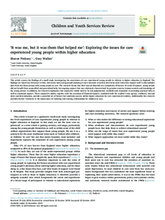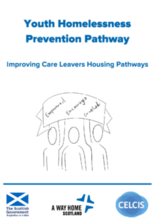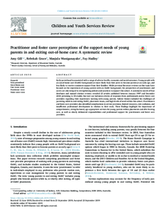Displaying 381 - 390 of 991
This article reports the findings of a small study investigating the experiences of care experienced young people in relation to higher education in England.
The aim of this study is to utilise nationwide social services data from two countries (Northern Ireland (NI) and Finland), with similar populations but different intervention policies, linked to a range of demographic and health datasets to examine the mental health outcomes of young adults in the years following leaving care.
This report and recommendations have been developed to improve the housing journey of care leavers in Scotland, and prevent homelessness for people with experience of care.
In this chapter from the book Education in Out-of-Home Care the authors explore their journeys to and through university and doctoral studies, drawing in the experiences of other care leavers who have gone to university and care leavers they have encountered through their research into this topic.
In this chapter from the book Education in Out-of-Home Care the authors highlight ongoing legislative and policy challenges related to postsecondary education for care leavers.
This chapter from the book Education in Out-of-Home Care reports on a qualitative doctoral study that investigated the experiences of New Zealand care leavers who went to university.
This conceptual chapter from the book Education in Out-of-Home Care argues that efforts to improve educational outcomes for care experienced young people need rethinking.
This chapter from the book Education in Out-of-Home Care aims to (1) provide an overview of educational background and educational expectations of adolescents aging out of care in Brazil; (2) examine associations between educational background and extracurricular activity and placement characteristics; and (3) discuss the specificities of education in care for adolescents in Brazil as well as its similarities with other countries.
This chapter from the book Education in Out-of-Home Care describes trends in the secondary and postsecondary educational attainment of care-experienced young people in the California Youth Transitions to Adulthood Study (CalYOUTH), support they received to pursue their education, and the obstacles they have encountered along the way.
This literature review sought to explore the perspectives of practitioners and foster care providers on the topic of young people in and exiting out-of-home care (OoHC) who become parents at an early age.



